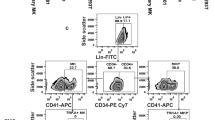Abstract.
Thrombopoietin (TPO) plays a critical role not only in proliferation and differentiation of megakaryocytes but also in erythroid differentiation. We have investigated whether the different pathway of mitogen-activated protein kinase (MAPK) after TPO stimulation may discriminate megakaryocyte and erythroid differentiation. In this study, we have used human CD34+ hematopoietic progenitor cells (HPCs) from cord blood (CB) in serum-free liquid culture supplemented with TPO, to compare the respective effects of specific inhibitors of MAPK kinase (MEK) (PD98059) and p38 MAP kinase (p38) (SB203580) on megakaryocyte and erythroid development. PD98059, but not SB203580, significantly suppressed TPO-induced megakaryocyte differentiation when examined by the expression of CD41 and polyploidy assay. In the presence of SB203580, CD34+/CD36+ erythroid progenitors clearly decreased, whereas they increased when cultured with PD98059. These results indicate that activation of extracellular-signal-regulated kinase (ERK) is required for TPO-induced megakaryocyte differentiation and that p38 is required for TPO-induced erythroid differentiation.
Similar content being viewed by others
Author information
Authors and Affiliations
Additional information
Electronic Publication
Rights and permissions
About this article
Cite this article
Miyazaki, R., Ogata, H. & Kobayashi, Y. Requirement of thrombopoietin-induced activation of ERK for megakaryocyte differentiation and of p38 for erythroid differentiation. Ann Hematol 80, 284–291 (2001). https://doi.org/10.1007/s002770000285
Received:
Accepted:
Issue Date:
DOI: https://doi.org/10.1007/s002770000285




